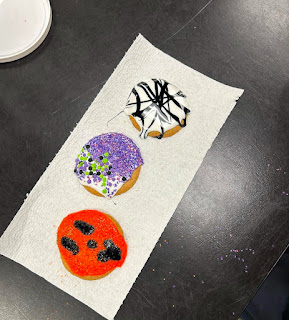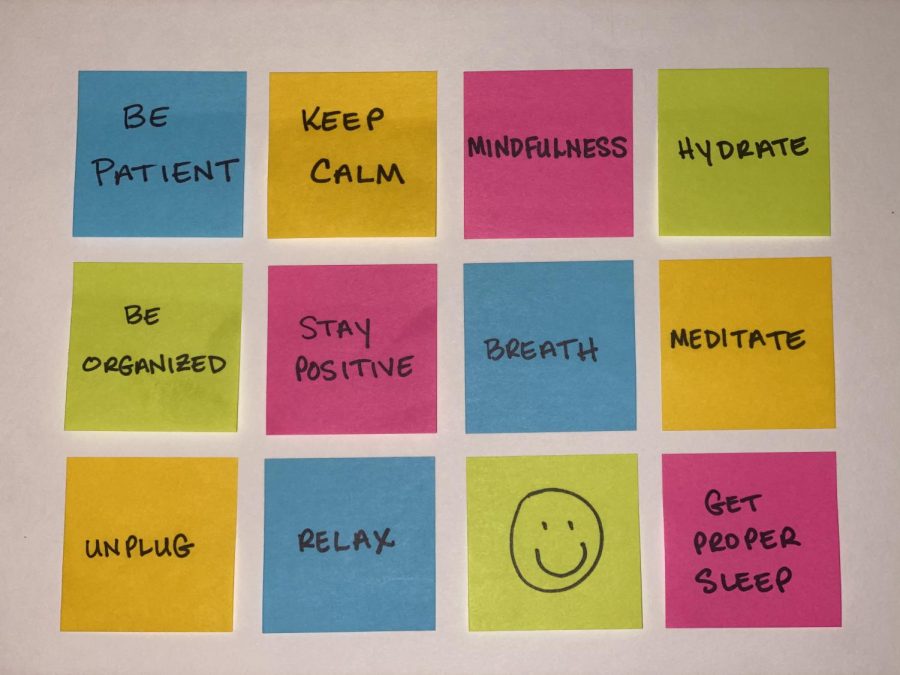MENTAL HEALTH DURING COVID-19
The Covid-19 outbreak brought upon lots of stress throughout the world, now with school starting back up, it is creating a lot more while kids are trying to adjust to school and stay healthy. Some small tips and tricks you can do to guide you when finding yourself in an anxious or bad state of mind are presented in the picture above.
October 6, 2020
“Attitude is a little thing that makes a big difference.”
— Winston Churchill
Adolescents are in a vulnerable position as they are experiencing cognitive development that increases their sensitivity levels. Their experiences at this age shape brain development and determine their state of mind. Bad experiences distress the mind and cause illnesses. The Covid-19 pandemic is now included in the list of unpleasant encounters that teens and adults all around the world have to manage.
The entire population was baffled by this unexpected turn of events. Most of us canceled plans and were stunned into silence.
Jiya Bhatt, a sophomore in the IB program, affirms this, “During the COVID-19 pandemic, I had to cancel both academic and summer plans. Within a week, my plans to volunteer in the summer, many of our competitive events, and any wishes of vacationing were canceled. Canceling plans was the only event on my list that was not canceled!”
The global perspective on health completely changed after the pandemic. Mental and physical health are equally important. Staying at home all the time is harder than it appears. Most teenagers around the world experienced some anxiety, loneliness, and stress.
Growing minds have an abundance of adrenal hormones that trigger anxiety. COVID worked as a catalyst in increasing this anxiety. The havoc led to depression in some.
“As someone who has always been slightly reluctant to change, the COVID situation impacted my perspectives on normality. In my rare, low times, I seemed to overthink minor inconveniences that sometimes would upset me,” stated Bhatt.
Extreme symptoms of anxiety include constantly checking the news, fear from things that are ideally part of the routine, or even leaving the home. Nevertheless, follow experts’ advice and take deep breaths. Stay grounded! Recognize that everyone has fears and one’s response to that fear determines how to get through a crisis.
Similarly, depression due to loneliness was common among teenagers.
“I actually started feeling more stressed when COVID happened because I was home all the time and I really felt like I had no use so for some reason, I got really worried” observed Toni Curry, a sophomore in the IB program.
The confused minds looked for remedies to cope up with this situation. Hobbies are a great way to cure isolation and bring positivity. Divert your attention by watching movies or dancing with your favorite K-pop band. You might even learn a new skill! Remember how the world encountered a cooking revolution wherein we got many rising chefs?
“I quickly discovered that I could change my discomfort to joy by just plugging in my earbuds and pursuing a passion that I have had since I was little: dance. In addition to dance, I often found myself at ease when I sat to do mere little things like draw, play a game of chess, or even attempt to learn something new,” recalled Bhatt.
Also, pursue your passion and pace yourself by setting personal goals. The satisfaction from achieving them cannot compare to any bad in the world (yes, even the pandemic).
Curry relates, “I started playing the piano a little bit more and I kind of altered my style a little bit and it made me pretty proud.”
In addition, reach out to your friends and family! You can spark random conversations with friends. Try talking about their interests. It is a great way to keep your friends engaged and provide yourself a positive distraction.
Curry recommends to, “tell someone how you feel because it isn’t good to go through these things alone, especially in times like this, you never know where you could end up so just find someone you feel that you could trust and have them help you through whatever you’re going through.”
There are many more illnesses and self-curing practices that this article cannot cover, but if you or your loved ones ever need support make sure to explore your resources. There are many doctors and mental health professionals that have virtual sessions. Check out organizations such as the Substance Abuse and Mental Health Services Administration, National Alliance On Mental Illness, The International OCD Foundation, National Eating Disorders Association.
The pandemic has truly brought the world to a standstill, but that doesn’t mean you have to carry the extra burden. Ground yourself – because you are resilient. This is not the end, a new beginning is yet to come. With more fervor and determination we can battle this situation. And as Bhatt advised,
“Keep going, and don’t focus on the past. Instead of dwelling upon what we have missed, we can look forward to what is coming.”
In other words, a plethora of obstacles cannot cease the young minds from dreaming big and achieving their ambitions.
























